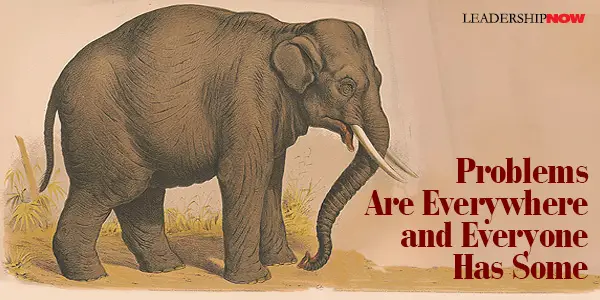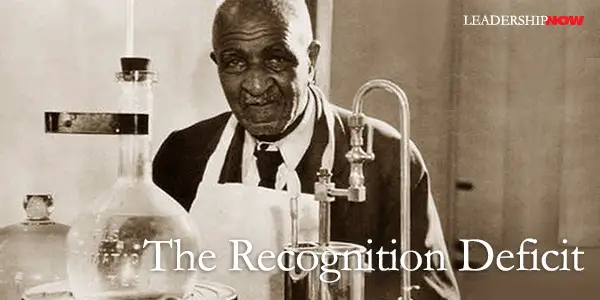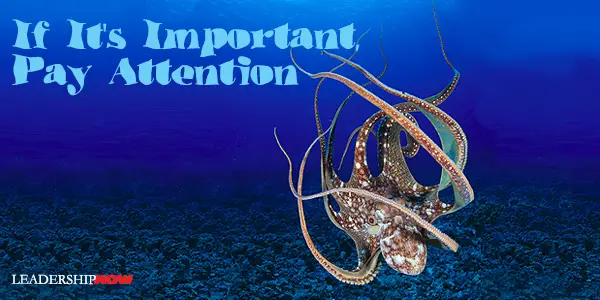 Leading Blog | Posts by Month |
 Leading Blog | Posts by Month |
08.31.06

Desmond Tutu on Real Leadership
Desmond Tutu, South African cleric and recipient of the 1984 Nobel Peace Prize, gave a speech recently at the Harold Wolpe Memorial Lecture in Cape Town. Here are some of his edited comments from that speech on Real Leadership: I thought it might not be entirely inappropriate to talk about leadership—true, real leadership. There is an episode in the Christian Gospels when the disciples of Jesus were bickering about leadership positions. So Jesus called them together to give them a profound lesson on true greatness real leadership, and it turned out to be one of the most paradoxical statements ever. Just listen: "And when the other ten apostles heard it, they began to be indignant with James and John. But Jesus called them to Him and said to them. You know that those who are recognized as governing and are supposed to rule the Gentiles lord it over them, and their great men exercise authority and dominion over them. But this is not to be so among you; instead, whoever desires to be great among you must be your servant. And whoever wishes to be most important and first in rank among you must be slave of all. For even the Son of Man came not to have service rendered to Him, but to serve, and to give His life as a ransom for many." (Mark 10: 41-50) Now, what kind of advice is that? Totally unrealistic, sentimental, and utopian. They would make mincemeat of you in a hard-nosed cynical world where it is dog-eat dog, survival of the fittest, and devil take the hindmost, and everyone for himself in a setting of cutthroat competition. But is that kind of success really what people, in fact, admire, indeed revere? The leader is there for the sake of the led. The formula Jesus propounded clearly was not so utopian and unrealistic. Almost all who have become outstanding leaders have demonstrated this remarkable attribute of selfless altruism. The leader is there not for what he/she can get out of this exalted position. No, the real, the true leader knows the position is to enable the leader to serve those she leads. It is not an opportunity for self-aggrandizement, but for service of the led. Integrity: People look up to their leaders for inspiration; they somehow believe they embody their best ideals, attributes, and characteristics. This is how they want to believe they would be at their best. They want their leaders in a way to be a Colossus without blemish, a paragon of virtue, of impeccable moral standards, not an idol with feet of clay. There surely is conduct which might be tolerated in a lesser mortal, but that would be anathema in the Head of State. We speak of gravitas, of in our language shadow, isthunzi, a presence. We want to experience our head of state as being presidential. He/she is not an ordinary person. Humility: Almost paradoxically, we also are attracted to a head of state who is humble and approachable, not arrogant and aloof. People want their leader, as it were, to have charisma, to be regal and exalted, dignified, almost godlike as expressing the best about their idealized corporate consciousness and identity. But they also want them to be people of flesh and blood, not remote, but down to earth in touch with them, aware of their aspirations, anguish, needs and know where the shoe pinches. No human being is infallible: Most politicians seem to have a massive allergy to admitting they might have been wrong. I suspect most of us find humble pie unappetizing. We do not like to admit that we made a mistake. It is our peculiar hubris. A leader leads by leading: A true leader whilst eager to carry his constituency with him whenever possible, sometimes has to take a stand that is not too popular with his followers. But the real leader then demonstrates his mettle by leading through leading. It requires courage to do this, but the leader recalls that the tortoise makes progress only when it sticks its neck out. Leadership can be a lonely vocation. Bishop Charles Albertyn used to tell us this story, In this establishment, there are only two rules. Rule No. 1 - The boss is always right. Rule no. 2, in case the boss is wrong, refer to rule No. 1. It may seem as if the kind of leader who uses this style is always in charge, things happen, everybody dances attention. But in fact, it is self-defeating. It allows resentment and anger to build up in those who have been humiliated by the apparently decisive boss and then one day even the worm will turn.
Posted by Michael McKinney at 02:09 AM
08.28.06

Problems Are Everywhere and Everyone Has Some
 When we respond to troubles and problems in a positive way, we can more easily maintain our creativity and resourcefulness that will come in handy in resolving the issue. A positive response can keep us in problem-solving mode. A good example of reframing a situation for an overall positive outlook comes from one of my favorite opening lines. It is from a good piece of writing by George Orwell (Eric Blair) entitled Shooting an Elephant. In Moulmein, in Lower Burma, I was hated by large numbers of people—the only time in my life that I have been important enough for this to happen.
Posted by Michael McKinney at 12:45 AM
08.25.06

Vital Friends: Who Expects You to Be Somebody? TOM RATH provides an excellent book with Vital Friends. His analysis of the problem is good and the need to focus more on developing the right kind of relationships between people is right on. He rightly states that “friendships are among the most fundamental of human needs. The energy between two people is what creates great marriages, families, teams, and organizations.”
TOM RATH provides an excellent book with Vital Friends. His analysis of the problem is good and the need to focus more on developing the right kind of relationships between people is right on. He rightly states that “friendships are among the most fundamental of human needs. The energy between two people is what creates great marriages, families, teams, and organizations.”
I liked his question, “Who expects you to be somebody?” If you can’t think of anyone, there is something—or perhaps someone—seriously lacking in your life. Rath gets a little tangled up in trying to understand how, with all of the personal development programs available to us, we fail in our relationships. He at times seems to blame self-improvement programs and throws the baby out with the bathwater. Improving yourself is the key to better relationships. But the key to good self-improvement is the focus—the what, why and how of it. Certainly, the I-gotta-be-me self-indulgent inner journey to self-understanding is worthless. I-gotta-be-me is what got us where we are in the first place. The point of personal development is to change me from what I am to a more principled and presentable me. An inward focus on personal development will only have a marginal effect on your relationships. Personal development needs to have an other-directed focus to it for it to be meaningful. Self-understanding helps you to understand others. And that understanding should give you a basis for creating relationships built on outgoing concern for and patience with other people. Improving yourself just to be improving yourself is selfish and of little value. In the end, it will give you little satisfaction and few friends. Selfishness kills relationships. Rath suggests that maybe we need to take a course on friendship. He asks, “Could a second-grade student, a high-school junior, a college freshman, your boss, or even you benefit from time dedicated to this pursuit?” Resoundingly yes! To this end, Jeffrey Gitomer’s Little Black Book of Connections is full of sound principles that can be applied here. I know you’re thinking that this is "another sales tomb," but this is much more and applies to all relationships. Rath also provides ample evidence that friendships at work should be encouraged. Although most companies don't encourage, and some outright forbid, Gallup research shows that close relationships between workers boosts employee satisfaction by almost 50%. Even though spending time with the boss was rated as the least pleasurable time of the day, they found that when employees do have close friendships with their boss, they are more than twice as likely to be satisfied with their jobs. Do the people you influence know you expect them to be somebody? With the purchase of Vital Friends you get access to the web site where you can not only take the Vital Friends Assessment, you can begin to catalog your vital friendships and employ tools to develop stronger relationships with those people. 
Posted by Michael McKinney at 08:45 AM
08.23.06

Highest Presidential Approval RatingsIN the United States, presidential job approval ratings were introduced by George Gallup in the late 1930s. The Gallup Poll has ranked ten presidents by their highest approval rating. It is interesting and the results may surprise you.
Posted by Michael McKinney at 12:05 AM
08.21.06

Leading From Within
FROM THE CLASSROOM of Harvard Professor Scott Snook comes an article about leadership styles. It reaffirms the importance of the leader’s self-knowledge. This is not just a cursory overview but an understanding of what we really think on issues we would rather not think about. In Leading from the Maze Jeffrey Patnaude writes, “[T]he leader must be awake and fully alert. Like a nighttime traveler attuned to every sound in the forest, the leader must be aware of all possibilities lurking in the shadows. For we can neither challenge not transform what we cannot see.” Professor Snook said: What you believe about human nature influences your leadership style. If you believe people are fundamentally good—good meaning that they're trying to do their best, they're self-motivated, they want to perform—then your fundamental leadership style will be one way. It will be empowering them, getting obstacles out of the way, and setting high goals while maintaining standards. The better we understand ourselves, the more authentic the contribution we can make—shed the image and do the job.
Posted by Michael McKinney at 09:59 AM
08.18.06

What You Bring to the Table is You
Never forget your integrity and credibility. Character takes a lifetime to build—it represents the sum of all of your actions. And now, more than ever, it can be destroyed in a moment. So please define your individual values and decide where the line is that you will not cross. Always communicate within the boundaries of those values.
Posted by Michael McKinney at 09:00 AM
08.16.06

Thoughts from Lou Holtz
 Choices Count: “When you accept the fact that you are in your present condition, good or bad, because of the choices you have made, you will then find yourself capable of changing your situation by making better choices.” Respect: “What I didn't realize was that authority comes with the job: respect was what I needed to earn, and you earn respect only by proving yourself as a leader.” Faith: “Before joining the Notre Dame family, I heard a lot about the spirit of Notre Dame, but I wasn't sure what that meant. The people were spiritual, and the leaders of the university were driven by the Holy Spirit, of that I had no doubt. But I wasn't convinced the campus itself held anything spiritual. Then, in my first year, I made an interesting observation. I realized that if you don't believe in the omnipresent spirit of Notre Dame, you never feel it. I made up my mind that I was going to believe in this spirit. The moment I started believing, I started feeling it. And the feeling never left.”Staffing: “I expected us to recruit attitude over athleticism, and an aptitude for hard work over natural ability.” Personal Responsibility: “Before you start blaming others, look at yourself. You will find you must look no further for the cause of the problem.” 
Posted by Michael McKinney at 08:34 AM
08.14.06

The Recognition Deficit
GEORGE WASHINGTON CARVER wrote, "How far you go in life depends on your being tender with the young, compassionate with the aged, sympathetic with the striving, and tolerant of the weak and the strong. Because someday in life you will have been all of these." Understanding and encouragement will take people further than almost anything else you can do for them. Followers want recognition for their contribution. It is one of those things that have incredible leverage. The small investment on your part is greatly exceeded by the impact it has on someone’s life. Not only in that person’s life but the lives of those they come into contact with. It has a rippling effect. Considering its value, it’s amazing how little it is done. Frankly, if it were considered more of a priority in the leader’s agenda it would happen more. Yet without it, any leader’s effectiveness is diminished. It has to become an integral part of what we do. In Why Should Anyone Be Led by You? the authors comment: There are some particularly aggressive corporate cultures where the imperative is to “just do it.” Recognition is for wimps. All our experience is that effective leaders find ways to break through those barriers. Do you make people feel that their contribution is important? That they personally matter to the goals of the organization? It is what will make your efforts more effective. Everyone is in need of encouragement. Actress Celeste Holm summed up the issue well, “We live by encouragement and we die without it; slowly, sadly, angrily.” 
Posted by Michael McKinney at 10:26 AM
08.11.06

How Do You Know That?
 The state of our minds is the most important fact of our existence. Reality matters, of course, but for us individually, it is our state of mind that determines our perception of reality.
Posted by Michael McKinney at 08:30 AM
08.09.06

The Tripping Point
SUCCESSFUL PEOPLE lose more than the average person because they keep trying. Yet it often only takes one success to outweigh the many failures. A successful person takes smart risks. Persistence and the ability to deal with disappointment and often rejection are key characteristics for the successful person. In Success Built to Last by authors Jerry Porras, Stewart Emery and Mark Thompson, they call the inevitable stumbles or failures on the way to success, tripping points. It is these tripping points that successful people “harvest.” Successful people “think of both success and failure as feedback. The question is not whether they won or lost this round, but what they will do with the feedback.” They explain, “The bad news is that even when you’re doing your best, if you fail at any point, you’ll get harsh reviews. Think of the last time you got good press for bad news. … For much of the journey, innovation is hard work rewarded by bad headlines. “This is just one more reason why people hide out from pursuing their full potential to follow their dreams and serve the world. Enduringly successful people aren’t immune. They just tolerate risks, feel the fear, take the brickbats, learn from failure, and do what matters to them anyway.” Failures are inevitable. After you deal with them you must refocus your vision, learn from the failure and make new mistakes. The important thing is to keep moving forward. Successful people “become more resolute after losing a battle they believe in because they learn from the loss—it gives them a better idea of what matters, what works, and what doesn’t." They interviewed, among hundreds of others, retired Stanford professor James G. March who added this, “Short-term reality is an insult to the vision. You have to be self-delusional to create change—it’s a useful craziness guided or founded on your clear identity and knowing what you must do.”The book is an excellent survey of how enduringly successful people have made success happen. There are a lot of great nuggets in here worth taking a look at. We’ll look at a few more of them in the days ahead. 
Posted by Michael McKinney at 12:06 AM
08.07.06

The Neuroscience of Leadership
 David Rock, author of Quiet Leadership and Jeffrey Schwartz, a research psychiatrist at the School of Medicine at the University of California at Los Angeles report in Strategy+Business that scientists have "gained a new, far more accurate view of human nature and behavior change because of the integration of psychology (the study of the human mind and human behavior) and neuroscience (the study of the anatomy and physiology of the brain). As a result, researchers have found hitherto unseen neural connections in the living human brain. Advanced computer analysis of these connections has helped researchers develop an increasing body of theoretical work linking the brain (the physical organ) with the mind (the human consciousness that thinks, feels, acts, and perceives)." Several conclusions about organizational change can be drawn from the research that make the art and craft of management far more effective:
Here is the pivotal finding with important implications: Concentrating attention on your mental experience, whether a thought, an insight, a picture in your mind’s eye, or a fear, maintains the brain state arising in association with that experience. Over time, paying enough attention to any specific brain connection keeps the relevant circuitry open and dynamically alive. These circuits can then eventually become not just chemical links but stable, physical changes in the brain’s structure. What does this mean on a practical level? Focusing on the problem only ingrains it in the mind. Based on what we know now the focus should be on the new behavior. The process begins by painting a broad picture of the goal, without specifically identifying the changes that individuals will need to make. Then the leader should help his team to picture the new behaviors in their own minds, and in the process develop energizing new mental maps that have the potential to become hardwired circuitry. The leader would then get their team to focus their attention on their own insights, by facilitating discussions and activities that point toward the goal. After that, the job would be to regularly provide “gentle reminders” so that the new behavioral maps become the dominant pathways along which information, ideas, and energy flow. The leader also needs to catch the team when they get sidetracked and gently bring them back. The power truly is in the focus, and in the attention that is paid. Perhaps you are thinking, “This all sounds too easy. Is the answer to all the challenges of change just to focus people on solutions instead of problems, let them come to their own answers, and keep them focused on their insights?” Apparently, that’s what the brain wants. And some of the most successful management change practices have this type of principle ingrained in them. As Peter F. Drucker said, “We now accept the fact that learning is a lifelong process of keeping abreast of change. And the most pressing task is to teach people how to learn.” In the knowledge economy, where people are being paid to think, and with constant change, there is more pressure than ever to improve how we learn. Perhaps these findings about the brain can start to pull back the curtain on a new world of productivity improvement: in our ability to bring about positive, lasting change in ourselves, in our families, in our workplaces, and in society itself. Luc de Brabandere's The Forgotten Half of Change: Achieving Greater Creativity through Changes in Perception is also good in this regard. 
Posted by Michael McKinney at 08:24 AM
08.03.06

If It's Important, Pay Attention
A study from UCLA reports that multi-tasking affects the brain's learning systems, and as a result, we do not learn as well when we are distracted. "Multi-tasking adversely affects how you learn," said Russell Poldrack, UCLA associate professor of psychology and co-author of the study. "Even if you learn while multitasking, that learning is less flexible and more specialized, so you cannot retrieve the information as easily. Our study shows that to the degree you can learn while multi-tasking, you will use different brain systems. "The best thing you can do to improve your memory is to pay attention to the things you want to remember," Poldrack added. "Our data support that. When distractions force you to pay less attention to what you are doing, you don't learn as well as if you had paid full attention." Tasks that require more attention, such as learning calculus or reading Shakespeare, will be particularly adversely affected by multi-tasking. "Our results suggest that learning facts and concepts will be worse if you learn them while you're distracted," Poldrack said. The researchers noted that they are not saying never to multi-task, just don't multi-task while you are trying to learn something new that you hope to remember. Listening to music can energize people and increase alertness. Listening to music while performing certain tasks, such as exercising, can be helpful. But tasks that distract you while you try to learn something new are likely to adversely affect your learning, Poldrack said. This isn't startling information but it is nice to have it reaffirmed. We live in a world where we often find ourselves having to multi-task, but we should be aware of this. We just aren't going to be as effective. Poldrack suggested that a silent environment is not necessarily essential. Music, for instance, can help in learning because it can make the individual happier. But in general, distraction should be avoided.
Posted by Michael McKinney at 01:24 AM
08.01.06

Human Resources
Posted by Michael McKinney at 08:29 AM
|
BUILD YOUR KNOWLEDGE


How to Do Your Start-Up Right STRAIGHT TALK FOR START-UPS 
Grow Your Leadership Skills NEW AND UPCOMING LEADERSHIP BOOKS 
Leadership Minute BITE-SIZE CONCEPTS YOU CAN CHEW ON 
Classic Leadership Books BOOKS TO READ BEFORE YOU LEAD |
|